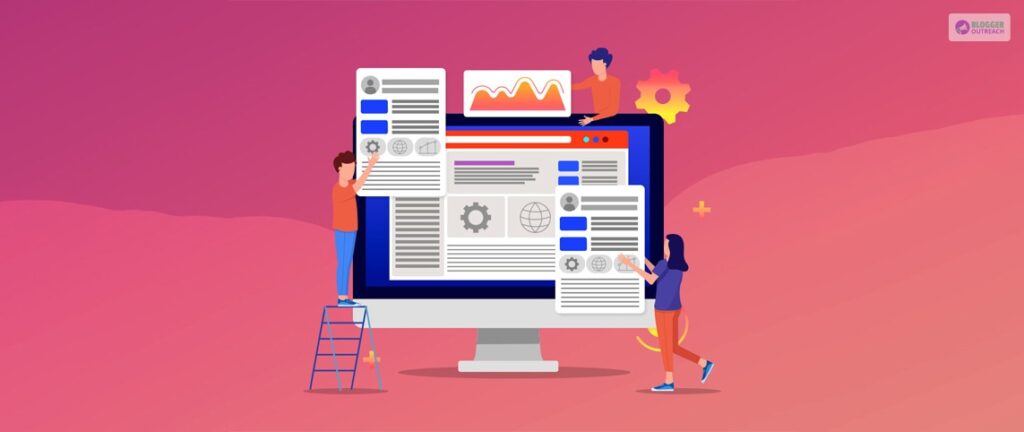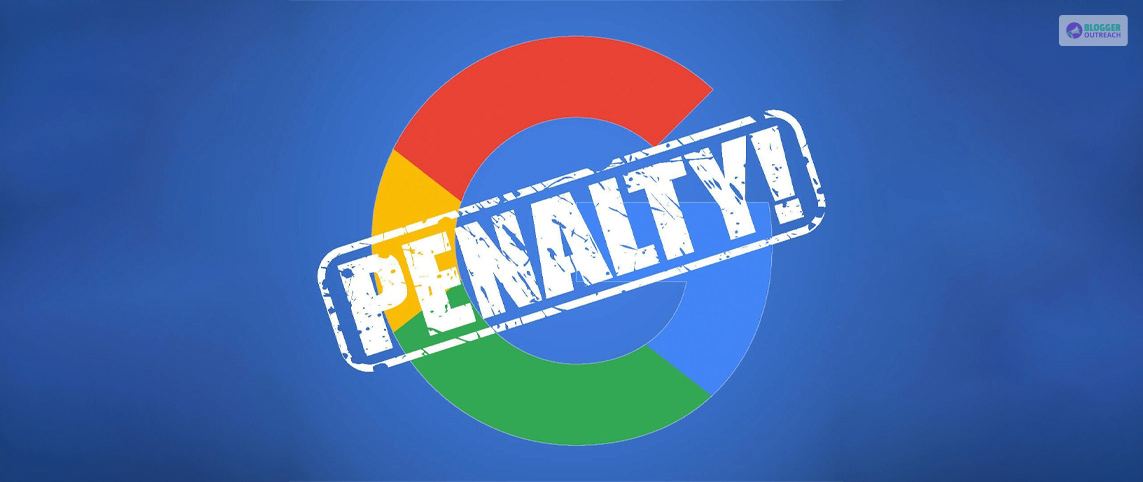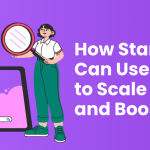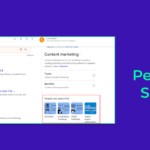Table Of Content
- 1 What Is Google Penalty?
- 2 Types Of Google Penalty
- 3 How To Identify Google Penalties?
- 4 10 Alarming Reasons For Google Penalties And How To Fix Them
- 5 Bottom Line
Did your website’s ranking suddenly drop?
Have you been smashed With a Google penalty?
Getting hit with a Google Penalty can be heartbreaking.
Your site traffic drops, and your rankings take a nosedive – it can seem like all is lost.
Understand the difference between algorithm updates & penalties so your website can continue.
Please find out how Google’s Panda & Penguin algorithms use a set of rules & calculations to ensure your website meets their Webmaster Guidelines standards.
Whether you practice black hat SEO intentionally, make mistakes during website maintenance, or experience an algorithm update, Google penalties can mean drops in rankings and removal from results.
Are you feeling the heat from Google?
Don’t lose hope: even if your site faces a penalty, the right steps can bring your rankings back.
Get Your Site Back on Track After a Google Penalty!
This article will look at different methods of google penalty recovery methods – from stolen content to other Google penalties. But before we jump into the details, let’s go over the basics.
What Is Google Penalty?

Regarding SEO, it’s important to understand the difference between an algorithm update and a Google penalty.
Algorithms are calculative measures and rules that help achieve the desired outcome, usually rewarding websites that meet Google’s quality standards.
A Google Penalty is a punitive measure given to websites that may have violated the regulations and guidelines set by Google in terms of marketing and advertising.
Google generally imposes a penalty-
- After changing its ranking formula.
- After a manual inspection, if Google believes that the website uses questionable SEO techniques.
Google uses human reviewers who manually review websites to ensure they meet the standards, even if they passed through the algorithm.
Types Of Google Penalty

Regarding Google penalties, there are two main types to watch out for: algorithmic and manual.
(i) Algorithmic Penalties
Algorithmic penalties are usually the result of algorithm updates or changes.
Important Google Algorithm Updates To Track Penalties
Google is constantly striving to prevent all sorts of malpractices. Let’s discuss some of the most important algorithm updates by Google-
Panda (2011):
Focused on low-quality content, including content farms, plagiarism, and keyword-stuffed content.
Penguin (2012):
This update targets websites with Poor quality links
- Build through any automated software.
- Bought from anyone.
Hummingbird (2013):
It aimed at long-tail queries and made it easier for people to use phones, mobile devices, or voice recognition devices to search by understanding human speech rather than keyword searching. Content with the best rankings answered questions, not just related keywords.
(ii) Manual Penalties
Google has a human auditors’ team responsible for triggering a manual penalty. Manual penalties occur when websites or web pages violate Google’s Terms of Service.
Your website may face manual penalties if it has malicious code, duplicate content, poor user experience, or is participating in link schemes or other black hat SEO tactics.
If your website has been manually penalized, you should receive a message from Google with the penalty details.
That said, paying attention to Google’s guidelines and prioritizing high-quality content beneficial to the user should help avoid any penalties. However, even innocent marketers can be penalized due to algorithm changes, so it’s important to be aware of how to recognize and handle Google penalties.
How To Identify Google Penalties?
Google penalties are serious issues that can significantly impact a website’s performance in search engine results.
Common Signals Of Google Penalty
The most common signs of a Google penalty include the following:
- A sudden decrease in organic search traffic and rankings.
- A reduction of overall website traffic.
- A manual action notification from Google.
- A decrease in website visibility on Google.
Sources To Check For Google Penalty
To determine if your website was penalized by Google, check two sources.
(i) Search Console
Tracking Google Penalty Through Search Console:
- First, open the Google Search Console to view any messages Google sent about potential penalties.
- Second, review your Google analytics traffic reports and compare traffic to the dates Google released updates.
- Under Security & Manual Actions, select Manual Actions to see if there’s a green checkmark stating “No issue detected.”
- If you’re concerned about an algorithmic penalty, check your ranking to identify any changes.
(ii) Google Analytics
Google Analytics provides a great deal of data that will help you identify:
- Any changes in traffic and visibility.
- It would help if you looked for changes in your website’s rank for targeted keywords and phrases.
- If you notice your website suddenly dropping in rank, you will likely be penalized by Google.
- You can also look for any manual actions within your Google Search Console indicating that Google has taken manual action against your website.
- If you identify a penalty, it is important to address the issue as soon as possible to regain your website’s ranking.
When identifying a potential Google penalty, it is important to understand how search engine algorithms work. Google uses algorithms to determine the relevance of a website to a user’s search query. Therefore, if your website provides relevant information to the user’s question, it may increase visibility and rankings.
It is also important to clearly understand the Google Webmaster Guidelines. Following these guidelines will help ensure that your website is not subject to any penalties. Additionally, it is important to monitor your website’s performance to identify potential issues.
You May Like To Read This: Drawbacks Of Pay Per Click Marketing
10 Alarming Reasons For Google Penalties And How To Fix Them
Are you hit with a Google penalty? Here are the top 10 reasons for Google Penalties and the hacks to fix them.
1. Thin Content

Low-quality content, such as content generated by tools, short-form articles, or scraped content, can harm website visibility in search results.
Google’s Panda 4.0 algorithm update is aimed at reducing low-quality content and doorway pages in search engine rankings.
To avoid similar issues, website owners should prioritize quality SEO content over quantity.
How To Avoid The Thin Content Google Penalty
- Before content creation, use keyword research to identify the right keywords to target and ensure that content matches the query’s intent.
- Create something unique, valuable, and cohesive. Don’t look for hacks or shortcuts.
- Ensure your content is unique by running it against plagiarism checks.
- Additionally, any content with low word counts should be beefed up or eliminated to ensure that it is useful and informative.
- If you need more time to do it alone, hire freelancers who specialize in your industry; they can produce pages that bring value to your readers.
2. Hidden Texts And Links

It comes under black hat SEO and involves adding hidden text, links, or code to a website that is not visible to the user except search engine crawlers.
Spammers use hidden links to drive traffic to specific pages or content, which can help increase the website’s overall visibility.
Google considers this activity as an unethical approach. On identification, Google can penalize the website with a ban.
How To Fix Google Penalty For Hidden Texts And Links
- You can use a URL inspection tool to identify hidden text.
- Discover content that is observable to crawlers but hidden from viewers with the URL Inspection tool.
- Either delete or make this content perceivable to humans and the search engine.
- Visit your website and inspect the main content, <title> tags, and alt text for repeated keywords or phrases that need to be clarified.
- Eliminate such words and ensure there is no keyword stuffing on your pages.
- Once you have identified and removed the hidden text, you should submit a reconsideration request to Google.
3. User-Generated Spam

Unsolicited promotional content, also known as spam, is commonly found in forums and blog comments.
This type of content involves-
- Spam content.
- Profiles with suspicious usernames.
- Posts that are not related to the page content or advertisement.
- Bot-generated content.
While this content may add a promotional advantage to a product or service, it can also be intrusive, annoying, and inappropriate.
Ways To Prevent User-Generated Spam
- First, delete all off-topic content.
- Then, search your website for spam or keywords unrelated to your site’s niche.
- Finally, go to the Manual Actions report and select Request Review.
Once you have completed these steps, check your messages for the review status.
4. Adding Unnatural Or Poor Quality Links

Google’s 2016 Penguin algorithm came to identify and devalue websites that utilize unnatural link-building tactics.
Such tactics include buying, selling, or exchanging backlinks, which can harm a website’s ranking if identified by the algorithm.
How To Refrain From Building Unnatural Or Poor Quality Links
To maximize success, building backlinks from credible and authoritative sources is essential, as this will help increase your website’s page authority.
Link building should follow an organic, natural approach.
Refrain from black hat link-building techniques.
It is important to implement a link-building strategy that is appropriate and does not involve the following:
- Buying or selling links.
- Link exchanges.
- Forum profile/signature links.
- Blog comment links.
- Article directory links.
- Building too many links in a short span.
- PBN links.
5. Cloaking

Cloaking is a technique to conceal malicious activities from security and system administrators.
By using cloaking, hackers can hide their footprints, making it difficult for administrators to detect malicious activities.
It’s important to understand that displaying different content to users and search engines is a bad idea that can result in penalties.
Your pages should not contain invisible or hidden text, flash pages, or redirect users to spam sites. Cloaking leads to a Google penalty, and you should avoid it for optimum results.
How To Fix Cloaking
- Ensure that Google can properly access your web pages using the URL Inspection tool in Google Search Console. This tool allows you to investigate any pages reported as cloaked or redirecting users, helping you identify any content that isn’t showing up normally.
- Visit your website and evaluate the differences between what appears on it and what the URL Inspection tool reports.
- Look out for URLs that might lead to spam sites and remove them. You can request a review by going to the Manual Actions report if there is a mistake in flagging your website.
- It is better to deploy firewalls and intrusion detection systems to detect any suspicious activities on the network.
- Conduct regular security audits and address any potential weaknesses in the system.
6. Keyword Stuffing

Keyword stuffing involves trying to tamper with Google’s algorithms by stuffing an overabundance of keywords into one page to secure a higher ranking. This can have negative consequences on a website’s ranking.
How To Avoid Keyword Spamming Google Penalty?
- To avoid keyword stuffing, you should focus on providing high-quality content relevant to your target audience.
- Additionally, they should naturally use keywords instead of unnaturally repeating the same phrase repeatedly.
- Website owners can increase their rankings and earn more organic traffic by creating valuable content for readers.
7. Spamming

Google’s penalty for spamming is a serious issue and requires careful consideration and action if you want to avoid it. It’s important to understand the reasons for spamming, as well as the consequences of it, to fix it.
Spam is irrelevant or low-quality content intended to manipulate search engine rankings or deceive users. This includes keyword stuffing, buying links, cloaking, and other tactics used to manipulate search engine algorithms.
Once you understand what constitutes spam, the next step is to take action to avoid it.
Avoiding Google Penalty For Spamming Involves
- You ensure that your content is relevant, high-quality, and not keyword-stuffed.
- You should avoid buying links or using tactics that could be considered manipulative. You should also monitor your website for signs of spam. This includes looking for suspicious links and unnatural patterns in content. If you find any signs of spam, you should immediately remove it and prevent it from happening again.
- Ensure that all of your website’s content is relevant and not manipulative. You should also make sure to disavow.
8. Issues With Structured Data Markup

Structured data markup is critical in ensuring that Google and other search engines correctly index your website.
Therefore, to maximize your website’s effectiveness, it is important to ensure that you implement structured data properly. Unfortunately, if not done correctly, it can lead to penalties from Google.
Remember, structured data markup is an essential part of SEO, and it is important to ensure that your website takes full advantage of it.
Here’s How You Prevent Penalties With Structured Data Markup
- Please ensure that your structured data is formatted correctly and up to date.
- Remove any data that is irrelevant or outdated. If the data is irrelevant or unrelated, it can be seen as spammy or manipulative, leading to a penalty.
- Monitor your structured data regularly to ensure it is still up to date.
- If you change your website and content, update your structured data.
Following these guidelines ensures that your website is properly indexed and not penalized by Google.
9. Spammy Host

Spammy hosts in SEO use unethical methods to increase their website ranking. These methods include buying links, creating spammy content, and using link farms to boost their rankings artificially.
Google penalties for spammy hosts can be a major issue for web admins.
Steps To Deal With Spammy Hosts
- Ensure that you only use reputable hosting companies with a history of providing quality services.
- Additionally, if you find yourself in the unfortunate situation of having spammy hosts, you should immediately take steps to remove them. This can include blacklisting them, changing your DNS settings, or contacting the hosting company to see if they can help.
- Once you have removed the spammy host, you should also ensure they do not return. This can include using a third-party service to monitor the IP address of the hosting company and blocking them if they reappear.
- You should also ensure that your website is regularly monitored and cleaned.
10. Sneaky Mobile Redirects

Recently, Google has been penalizing sites that use sneaky mobile redirects.
Sneaky Mobile redirects drive the user to another website beyond the crawler’s reach. As a result, the crawler fails to index the redirected page. And instead of indexing the original page, they index the redirected page.
How To Prevent Penalties With Sneaky Mobile Redirects
- Create content that is readable and easily accessible on various mobile devices.
- Check that the redirects implemented by you are working properly.
- Keeping track of any changes you make to your website is important, as this will help you identify any issues with the redirects.
- If you find a problem with a redirect, it is important to take action quickly to avoid any potential penalties from Google.
Bottom Line
Google penalties can be a costly mistake for websites that rely on search engine traffic. This article has explored 10 common causes of Google penalties and the steps to take to fix them.
From keyword stuffing and link schemes to hidden text and unnatural links, it is important to identify and address any potential issues to avoid a penalty.
Then, with careful monitoring of SEO practices and strategic content optimization, website owners can ensure their website complies with Google’s standards and can continue benefiting from organic search engine traffic.
For instance, If Google strikes you with a penalty, don’t panic. Instead, stay calm and follow the steps provided by us.
Still, have doubts? It’s ok to have doubts. If you have anything to ask, we are a text away!
Read Also:








